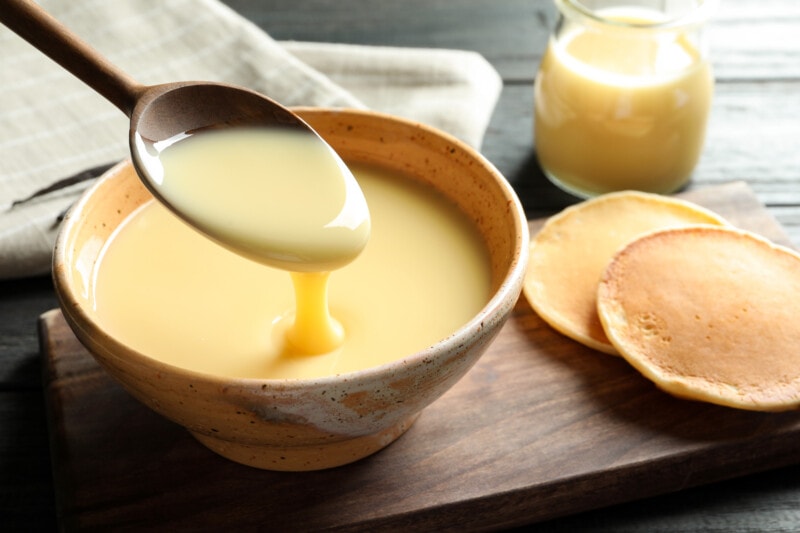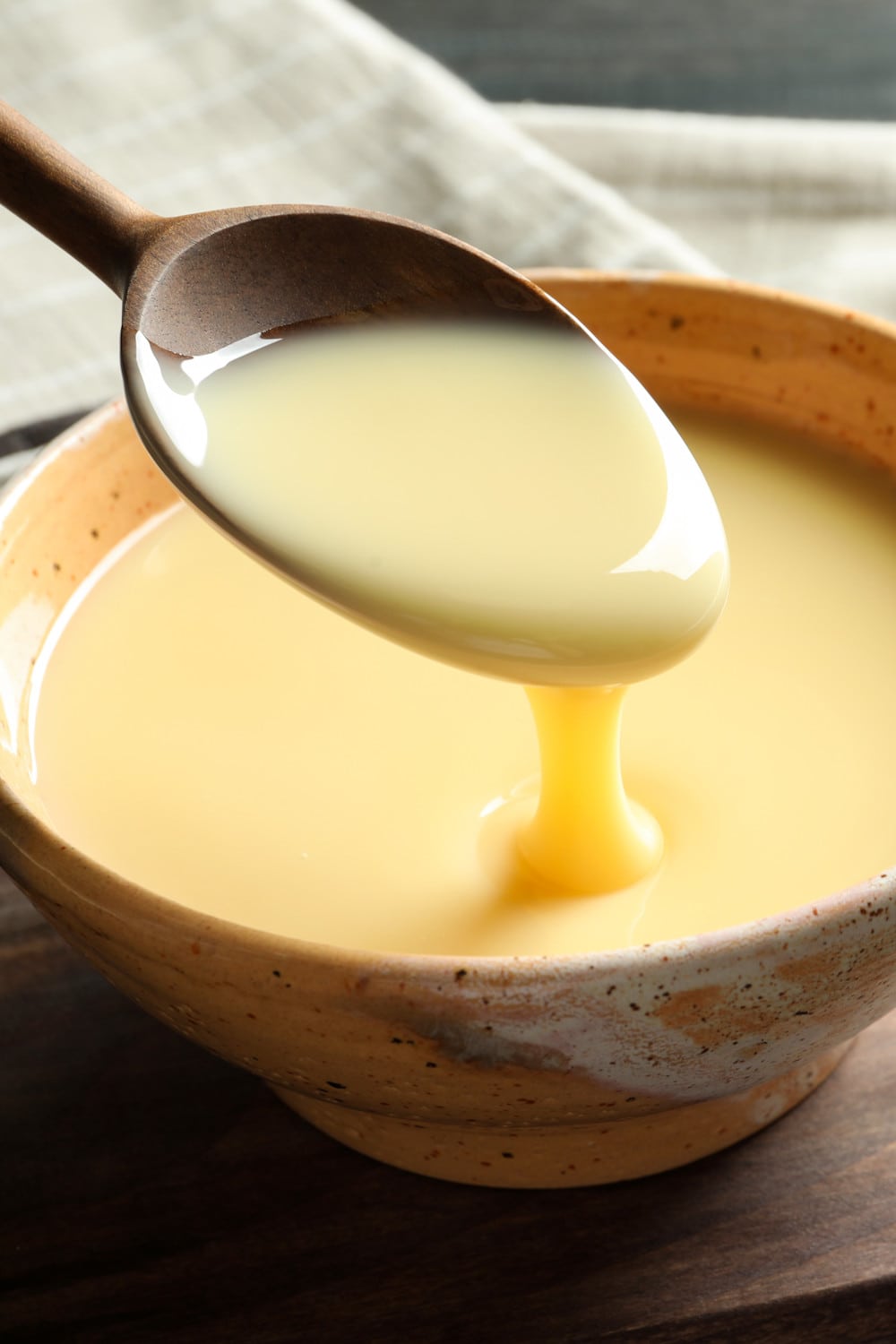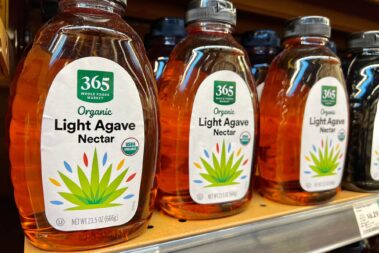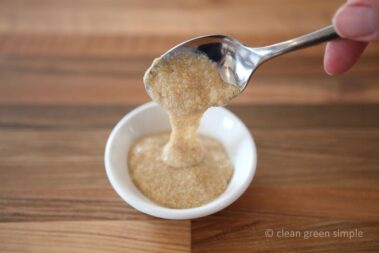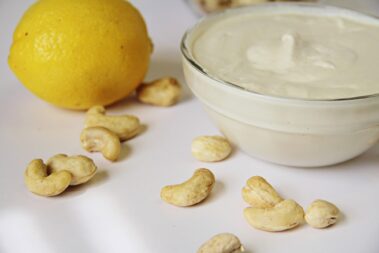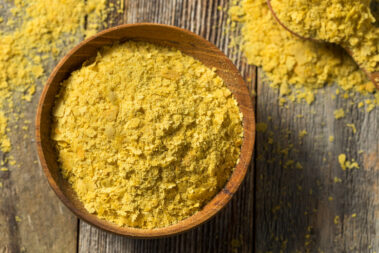Sweetened condensed milk is a staple of so many traditional baking recipes, which can be problematic if you’re following a vegan or plant-based lifestyle.
Luckily, we’ve found three vegan substitutes for sweetened condensed milk that worked amazingly well in a wide variety of recipes. We even created our own unique substitute recipe that we think is worth a try, as well.
Table of Contents
The Best Vegan Sweetened Condensed Milk Substitutions
These sweetened condensed milk vegan recipe alternatives are easy to throw together and use ingredients that are likely already in your pantry.
1. Full Fat Coconut Milk
The best substitute for sweetened condensed milk is full fat coconut milk with a sweetener. With only two ingredients, it’s one of the simplest recipes we tried and makes a very convincing condensed milk recipe alternative. This recipe has a bit of a coconutty flavor, but this is not overly noticeable when used in most baked good recipes.
When used in more straightforward applications, such as for dessert frostings or as a coffee additive, the taste is much more apparent, but not at all off-putting.
For this recipe, all you’ll need is:
- 1 can of full-fat coconut milk
- ⅓ c maple syrup, sugar, or coconut sugar
How to make full-fat coconut milk vegan sweetened condensed milk:
- Stir together the coconut milk and maple syrup (or sugar) into a small pot or saucepan.

2. Bring to boil then reduce heat to medium-low. Simmer for about 45 minutes, whisking every 5 minutes. The liquid should reduce by about half and turn from white to beige-ish (it will be darker if you use coconut sugar or maple syrup).
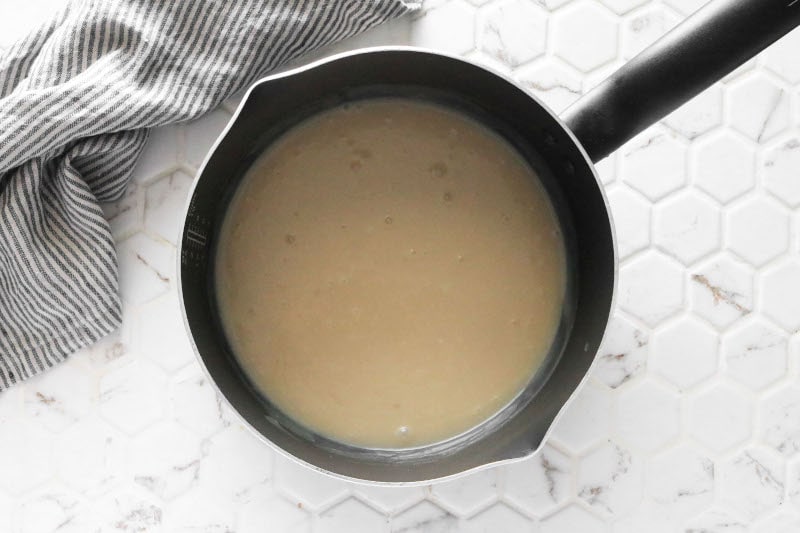
It’s important to whisk the liquid frequently, about every five minutes. This will prevent the mixture from bubbling over.
3. Remove from heat and allow to cool.
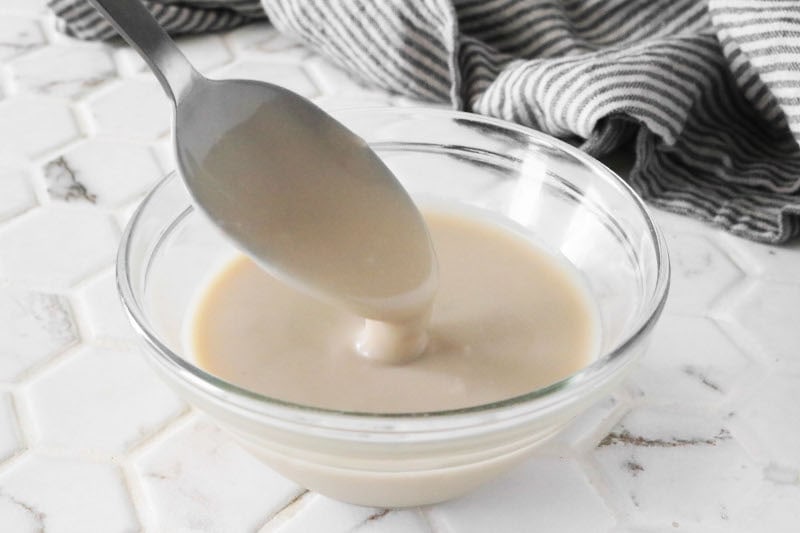
Once set, this sweetened condensed milk will keep in the fridge for about 10 days.
This recipe yields about ¾ cup of product. View the printable recipe card for this version below.
2. Soy Milk Powder
This version of vegan sweetened condensed milk requires a few more ingredients but takes a fraction of the time to prepare.
It also has more of a traditional condensed milk taste to it. But it does require soy milk powder, which can be a bit tough to find and is not suitable for those with soy allergies. (If this is the case, you can replace the soy powder with rice milk powder and get similar results.)
For this recipe you’ll need:
- 1 ¼ c soy milk powder
- ¾ c white sugar
- ½ c hot water
- 2 tbsp coconut oil
- ¼ tsp salt
How to make soy milk powder vegan sweetened condensed milk:
- In a blender, mix the soy powder and sugar.
- In a bowl, stir in the hot water, coconut oil, and salt.
- Add the liquid mix into the blender.
- Blend for about 1 minute until well combined.
- Pour into a container immediately and allow to cool.
Once cooled, this mixture will thicken to the perfect consistency to use in any recipe you would use dairy-based sweetened condensed milk.
This recipe yields about 1 ½ cups.
3. Nut Milk and Cashews
If you are looking for a healthier take on sweetened condensed milk, you’ll love this vegan alternative. Not only is it made using better-for-you ingredients, but it utilizes natural sweeteners rather than processed sugar.
The taste of this milk recipe is similar to the real thing but with earthier undertones. But if you are used to naturally sweetened baked goods, you probably won’t even notice.
For those with coconut allergies, this recipe is perfect. It does not utilize coconut milk or oil.
For this recipe you’ll need:
- 1 cup cashews
- About ½ cup almond or other nut milk
- ½ c maple syrup
- 1 tsp vanilla extract
- ⅛ c sea salt
How to make nut milk and cashew vegan sweetened condensed milk:
- Add all ingredients to a blender. (NOTE: If not using a high-speed blender, then you should soak the cashews overnight first.)
- Blend until smooth, about 2 minutes.
- Transfer to a pot or saucepan and simmer over medium-low for about 5 minutes, whisking constantly.
- Adjust the thickness by stirring in more milk or syrup as needed.
- Allow to cool.
This recipe makes about 1 ½ cups. It can be stored in the fridge for up to a week or in the freezer for months.
Expert Tip: Whisk Frequently to Achieve the Perfect Texture
The best vegan substitute for sweetened condensed milk is coconut milk and maple syrup. But for this substitute to perfectly emulate the real thing, you need to stir it frequently.
Once the ingredients have reached a boil, reduce the heat until you achieve a light simmer. From here, you must whisk the mixture at least once every five minutes. This is important to keep the bottom from burning, prevent it from boiling over, and to get that perfect consistency.
It will take about 45 minutes for the mixture to fully reduce. You’ll know you’ve hit that magic texture once the mixture has turned tan or beige and is thick enough to really stick to the whisk when you pull it out.
Condensed Milk vs Evaporated Milk
If you do a lot of baking, you’ve probably noticed that some recipes call for sweetened condensed milk while others call for evaporated milk. It’s important to note that these are similar but entirely different ingredients.
Both are created by exposing whole milk to heat to reduce it to a thick liquid. This is technically evaporated milk. Once sugar is added to the mixture, it becomes sweetened condensed milk.
If your recipe calls for the latter, the options above and below are perfect for creating a vegan substitute. But if the recipe calls for the former, you’ll want to reference our article on vegan substitutes for evaporated milk.
FAQ
Is sweetened condensed milk vegan?
No, condensed milk is not vegan. Condensed milk is made by taking whole dairy milk and exposing it to heat to remove 60% of the water. Sugar is then added to the thickened product to it sweet.
Can you buy dairy-free condensed milk?
Yes, there are a few commercial vegan condensed milk products you can buy. You can typically find them at natural grocery stores. My favorite brand is Nature’s Charm, which offers a coconut milk version and an oat milk version.
Does vegan condensed milk taste the same?
Yes, vegan sweetened condensed milk can taste very similar to traditional sweetened condensed milk. In my experience, the coconut milk and maple syrup substitute is the most authentic-tasting option, though it does have a bit of a coconutty aftertaste. In most recipes though, this won’t be noticeable.
Best Sweetened Condensed Milk-Free Recipes
Sweetened condensed milk is used in a variety of recipes, especially desserts, homemade ice cream, and pies. Here are a few of our favorite vegan alternatives to these recipes that don’t require sweetened condensed milk.
- Homemade Vegan Ice Cream Without A Machine – This genius recipe uses creamy blended bananas and maple syrup to make a healthier version of ice cream that is 100% vegan.
- Vegan Rice Pudding with Coconut Milk – This deliciously comforting rice pudding incorporates our coconut milk and syrup condensed milk substitute.
- Vegan Pumpkin Pie – So many pie recipes use sweetened condensed milk but not this awesome plant-based pumpkin pie.
- Creamy Vegan Lemon Bars – Here is another super tasty dessert that uses a version of our coconut milk substitute to emulate that thick sweetness of the real thing.
- Frozen Banana Cream Pie – This vegan banana cream pie is gluten-free and guilt-free.
Loving these recipes and vegan tips? Don’t forget to sign up for our newsletter to get more vegan love delivered to your inbox.
What’s the Best Vegan Sweetened Condensed Milk Substitute?
Hands down, my favorite vegan substitute for sweetened condensed milk is coconut milk and maple syrup. While it takes a little time to make, it only requires two ingredients and does the best job of emulating the texture of the real thing.
You can find a printable version of this substitute recipe below. If you’ve tried it, let us know what you think by posting in the comments section at the bottom of the post.
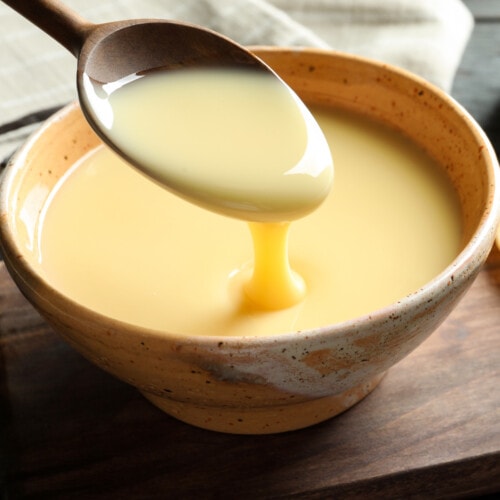
Vegan Condensed Milk Substitute
Ingredients
- 1 can full-fat coconut milk about 13.5 ounces
- ⅓ cup maple syrup or granulated sugar
Instructions
- To a small pot, add the coconut milk and maple syrup or sugar.
- Bring to boil then reduce heat to medium-low. Simmer for about 45 minutes, whisking every five minutes. The liquid will reduce by about half and develop a beige color.
- Remove from the heat and let cool. Store leftover condensed milk in an air-tight jar in the refrigerator for up to 10 days.
Notes
Nutrition
- How to Pick the Perfect Watermelon For a Sweet Summer Treat - April 10, 2024
- Future Kind’s Foundations: A Multivitamin Made for Vegans - December 5, 2023
- Does Nutritional Yeast Go Bad? - November 28, 2023

